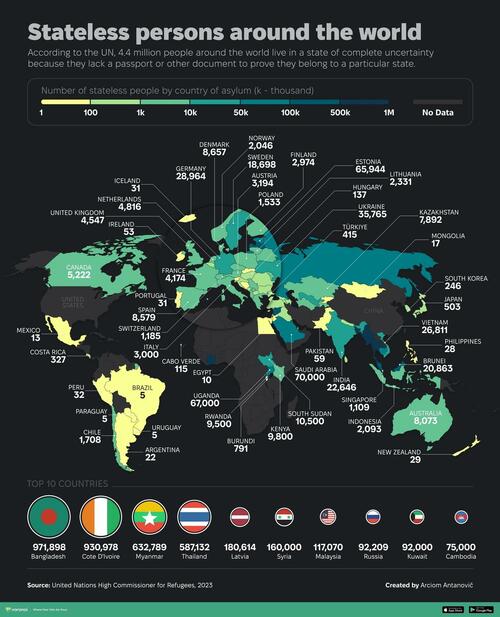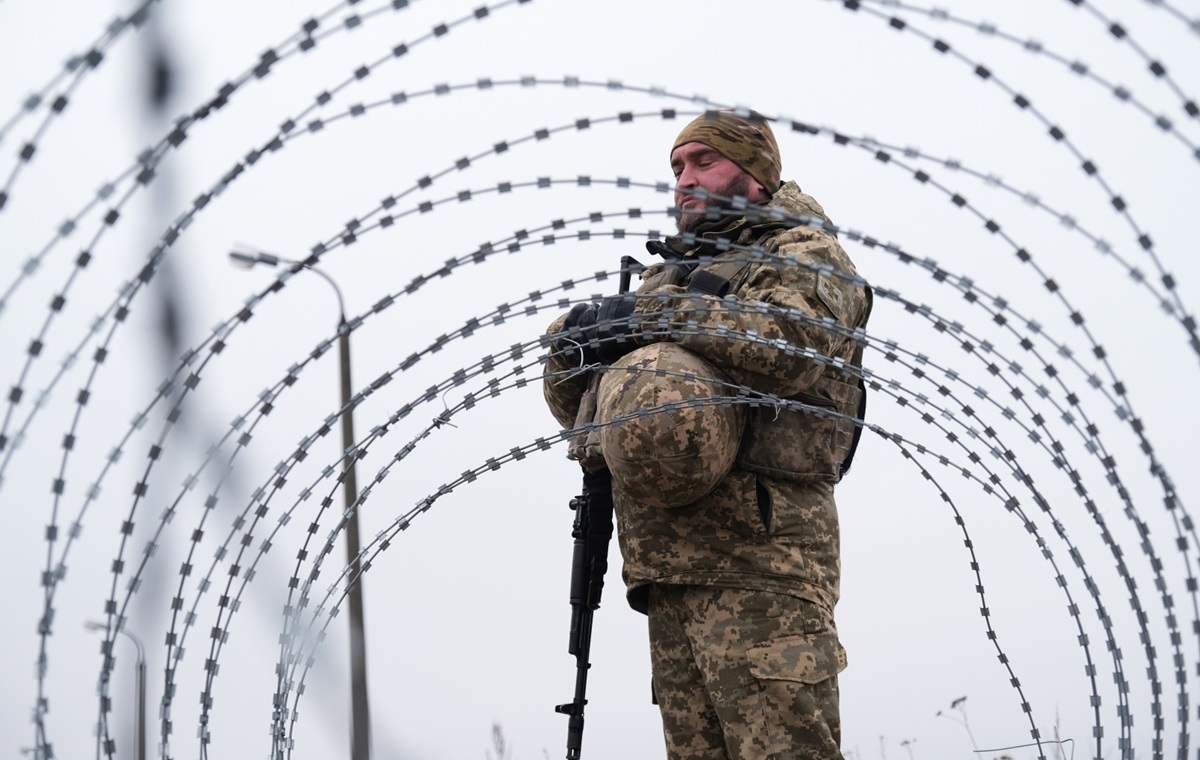
These Are The Countries With The Most 'Stateless’ People
The United Nations High Commissioner for Refugees (UNHCR) officially recognizes over 4.4 million people worldwide as stateless or of undetermined nationality. However, the actual number is likely much higher due to data collection challenges.
Stateless persons – those not recognized as citizens of any country – are deprived of fundamental rights such as education, healthcare, and employment, leaving them highly vulnerable to exploitation and discrimination. But which countries have the most?
This map, via Visual Capitalist, created by Arciom Antanovič, uses data from the United Nations High Commissioner for Refugees to show the countries with the most stateless persons in 2023.

Bangladesh Tops the List
Certain countries are home to a disproportionate share of the world’s stateless people, often due to historical, social, and legal complexities.
Bangladesh comes in first with 971,898, followed by Côte d’Ivoire with 930,978, while Myanmar comes in third with 632,789.
| Albania | 2,018 |
| Argentina | 22 |
| Armenia | 520 |
| Australia | 8,073 |
| Austria | 3,194 |
| Azerbaijan | 513 |
| Bangladesh | 971,898 |
| Belarus | 5,567 |
| Belgium | 936 |
| Bosnia and Herzegovina | 21 |
| Brazil | 5 |
| Brunei Darussalam | 20,863 |
| Bulgaria | 817 |
| Burundi | 791 |
| Cabo Verde | 115 |
| Cambodia | 75,000 |
| Canada | 5,222 |
| Chile | 1,708 |
| Costa Rica | 327 |
| Cote d’Ivoire | 930,978 |
| Croatia | 742 |
| Cyprus | 86 |
| Czechia | 1,611 |
| Denmark | 8,657 |
| Egypt | 10 |
| Estonia | 65,944 |
| Finland | 2,974 |
| France | 4,174 |
| Georgia | 530 |
| Germany | 28,964 |
| Greece | 3,743 |
| Hungary | 137 |
| Iceland | 31 |
| India | 22,646 |
| Indonesia | 2,093 |
| Iraq | 233 |
| Ireland | 53 |
| Israel | 35 |
| Italy | 3,000 |
| Japan | 503 |
| Jordan | 68 |
| Kazakhstan | 7,892 |
| Kenya | 9,800 |
| Kuwait | 92,000 |
| Kyrgyzstan | 20 |
| Latvia | 180,614 |
| Lithuania | 2,331 |
| Luxembourg | 201 |
| Malaysia | 117,070 |
| Mexico | 13 |
| Mongolia | 17 |
| Montenegro | 416 |
| Myanmar | 632,789 |
| Nepal | 489 |
| Netherlands | 4,816 |
| New Zealand | 29 |
| North Macedonia | 275 |
| Norway | 2,046 |
| Pakistan | 59 |
| Paraguay | 5 |
| Peru | 32 |
| Philippines | 28 |
| Poland | 1,533 |
| Portugal | 31 |
| Qatar | 1,200 |
| South Korea | 246 |
| Moldova | 3,267 |
| Romania | 287 |
| Russia | 92,209 |
| Rwanda | 9,500 |
| Saudi Arabia | 70,000 |
| Serbia and Kosovo | 2,329 |
| Singapore | 1,109 |
| Slovakia | 49 |
| Slovenia | 10 |
| South Sudan | 10,500 |
| Spain | 8,579 |
| Sri Lanka | 111 |
| Sweden | 18,698 |
| Switzerland | 1,185 |
| Syria | 160,000 |
| Tajikistan | 3,827 |
| Thailand | 587,132 |
| Türkiye | 415 |
| Turkmenistan | 3,583 |
| Uganda | 67,000 |
| Ukraine | 35,765 |
| United Kingdom | 4,547 |
| Uruguay | 5 |
| Uzbekistan | 22,496 |
| Viet Nam | 26,811 |
The raw number drops significantly after the fourth-placed Thailand with 587,132, as the fifth-placed Latvia only has 180,614.
The Causes of Statelessness
One of the primary drivers of statelessness is that in some countries, nationality can only be inherited through the father. When fathers are absent, the children may be left without a recognized nationality. This issue is particularly harmful for single mothers and families separated by conflict or migration.
Another significant cause of statelessness is racial and ethnic discrimination. Some governments use citizenship laws to exclude specific minority groups. In Myanmar, the Rohingya are a well-known example of such discrimination.
Geopolitical changes, such as shifting borders and citizenship revocation, also contribute to the issue. Governments sometimes strip individuals of their nationality as a punitive measure.
Which countries in the United States are not recognized by all members? See this unique visual from Julie Peasley on Voronoi.
Tyler Durden
Tue, 12/31/2024 – 04:15














